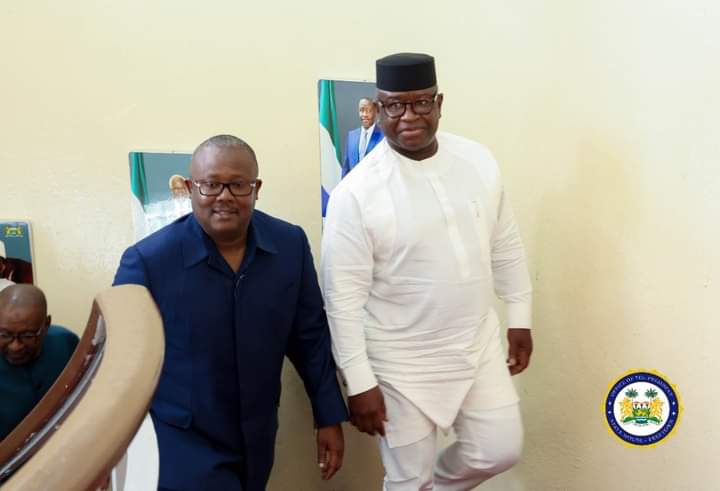The Chairman of the Economic Community of West African States (ECOWAS) and Bissau Guinean President, Umaro Sissoco Embalo, has called for dialogue among Sierra Leone’s political leaders in the interest of peace.
President Embalo particularly urged President Julius Maada Bio to open his doors for dialogue with the opposition, noting that he had engaged former President Ernest Bai Koroma who consented to a meeting with his successor.
Embalo, who visited the Sierra Leonean capital, Freetown on Monday, held talks with President Bio before addressing a meeting of senior government officials, diplomats and the press. He noted that for peace to reign and for the country to continue on its path of progress, both sides in the political divide must listen to each other.
“Violence has no place in a democracy, particularly in a country like Sierra Leone that has made immense progress in building democracy and was recently named as the 4th peaceful country in Africa,” he said.
“Sierra Leone has made great progress in the area of democracy and respect for the rule of law and good governance,” he added, noting that the international community, including ECOWAS, would continue to work with the country to maintain this progress.
It is Embalo’s first visit to Freetown as head of state.
State House Press Secretary, Yusuf Keketoma Sandi, said the ECOWAS Chairman spoke with President Bio last week after the August 10th deadly protest. He added that this visit was meant for him to get firsthand information about the situation on the ground.
ECOWAS was one of the first international organizations that issued statements condemning the violence. The West African bloc at the time called on the Bio administration to investigate the cause of the violence and to bring all those responsible to justice.
Embalo reiterated that call on Monday.
“As Chairman of ECOWAS, I have followed with interest the event that took place in Sierra Leone, that led to the death of innocent citizens including law enforcement officers and the destruction of properties,” he said, strongly condemning the attack on the police, which he said didn’t make sense.
“This is an advice from my heart because we are brothers and sisters. This is not a good example. Good citizens don’t kill police,” he said.
President Embalo however expressed delight at the steps already taken by the government, from the updates he got from President Bio, to bring the country back to normalcy. He said he was particularly happy that the authorities had launched an investigation into the cause of the violence.
Embalo also said President Bio informed him that he intended to meet with traditional leaders, civil society and political parties as part of an ongoing dialogue process.

A former army General, Mr Embalo has been President of Guinea Bissau, a country with a dark history itself, since 2020. He also served as Prime Minister of the former Portuguese colony between 2016 and 2018.
Embalo assumed the chairmanship of the 15-member West African bloc in early July, succeeding Ghanaian President Nana Akufo-Addo Dankwa. He has been preoccupied with political crises in three of its member states – Mali, Guinea and Burkina Faso.
President Embalo believes that in spite of its own history, Sierra Leone could also learn from his country, which was engulfed in over two decades of political turmoil. He said one thing he learnt as an opposition was that one needs to know that you risk destroying the country you seek to govern.
Embalo said he spoke with Ernest Bai Koroma prior to his arrival in Freetown, noting that he urged the former Sierra Leonean leader to engage with President Bio. He said Koroma promised to meet Bio when he returns to Freetown from Kenya where he is currently heading an African Union observer mission.






















